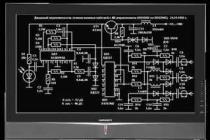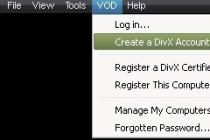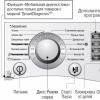Today is the day of system administrators, which was invented for the first time in Chicago by computer scientist Ted Kekatos, an American by birth, exactly 11 years ago in 1999. Since then, the last Friday of July is celebrated every year by many people who call themselves sysadmins. So who are these people?
A sysadmin is an employee of a company, an enterprise who ensures the smooth operation of a whole group of computers, is responsible for its security, and also monitors installation updates software... The position of the sysadmin includes constant control over the equipment, backup systems, important information, as well as recovery of systems and software software as a result of a failure.
In the middle of the last decade, system administrators were ordinary people - self-taught with certain skills in the field of computer science. At present, the system administrator has a number of requirements and obligations. For this, there are special organizations that train specialists in this field, presenting them with certificates at the end of the course and successfully passing the exams. For example, Microsoft Certified Professional (MCP) and Linux Professional Institute (LPI).
System administrators are divided into several groups. System administrators at Windows systems and admins who work on Linux / Unix systems. Network Administrators - This is mainly the people who work with Cisco networks. A special group includes system administrators working with a database, mainly Oracle.
Relatively recently, a group of people monitoring virtual systems - VirtualMWare and those responsible for the operation of the web server - web administrators have been added to them. Depending on the state of the enterprise, there may be one or more of them.
Let's see who the system administrators are. Indeed, in recent times so called almost everyone who works in the computer field. Previously called programmers, now they learned a new buzzword "sysadmin".
Enikeys, not administrators
Who works for thousands of small businesses? Anyone, but not the admins, but rather the enikeys. That is, handymen, only in the IT field.
Their job is as follows:
- Give it, bring it;
- replace the cartridge;
- install Windows;
- install the office and set up the program.
In the best case, such small companies have file sharing within the network, and perhaps a domain controller. In a slightly larger organization, there may be a mail server and a corporate website that are running on a local machine (I don’t presume to judge whether this is good or bad).
After all, you don’t think that all this thousandth army of enikeys from small firms can be called “sysadmins”? Otherwise, this country would not have experienced a "staff shortage" and would not have begun to independently prepare administrators for themselves almost from scratch, just out of boredom. It was not for nothing that a lot of money was allocated and a huge amount of time was spent, a whole independent department was created to communicate with students, many of whom did not even have work experience. Recruiting was in full swing, Yandex was looking for all competent specialists, so that later they would grow up professionals who certainly do not communicate with users and do not change cartridges for them.
Defining a system administrator
The very phrase "system administrator" was formed from the fact that there are information systems, and there are, accordingly, people who somehow administer these systems. Pay attention, namely Information Systems.
Information system is a computing system (networks, software, hardware) and information. The IP user is really a user, not an object to which the work of the system administrator should be directed.
System Administrator- the person serving the system. Maintaining its operational state, working out its architecture, optimizing its work, and so on. But not a person who communicates with users and configures their computer or printer.
By this I want to say that if an employee enters the connection of keyboards, mice, monitors and everything else, then call him what you want, but not an administrator. If the employee who manages the system installs and configures workstations on a daily basis, then he is already an engineer. At the same time, the most important task of a system administrator is to build a system that anyone can work with. It should be clear, concise, documented.
System Administrator or system administrator Is an employee in job duties which includes ensuring the correct and stable operation of computer equipment, networks and software, as well as information security of the company. Alternative names: sysadmin(eng. sysadmin), often just admin.
In duties system administrator includes not only tracking network security organization, but also creating optimal performance of computers and software for users who are often related common work for a certain result.
Often, system administrator functions assigned to IT outsourcing companies. As a rule, an outsourcing company provides a lower maintenance cost than the maintenance of a full-time system administrator and carries out work on the basis of a subscription agreement.
Due to the rapid growth and development of network technologies, it is becoming more and more difficult for a lone system administrator to deal with all the problems, therefore, specialized forums and printed publications have long appeared, aimed at exchanging experience among novice system administrators and providing assistance in solving various problems.
Professional holiday of the system administrator- the last Friday of July.
System Administrators Specializations
System administrators can be divided into several categories:
Web server administrator
Engaged in the installation, configuration and maintenance of web server software. As a rule, he works for a hosting company. It requires knowledge of Unix systems (mainly Linux and FreeBSD), the ability to configure the Apache web server and mail servers (qmail, Sendmail, Exim, Postfix), which are installed on more than 90% of web servers worldwide; optional IIS web server and OS family Windows Server... A deep understanding of the OSI model, the TCP / IP protocol stack is required.
Database administrator
Specializes in database maintenance. You need deep knowledge of the DBMS (at least one of MySQL, PostgreSQL, MS SQL, Oracle, Informix, Firebird), the operating system on which the database is running (Windows Server, * nix (mainly Linux / FreeBSD) or Solaris), knowledge of features implementation of databases, as well as knowledge of the information-logical language SQL.
Network administrator
Engaged in the development and maintenance of networks. Requires deep knowledge in the field of network protocols(TCP / IP stack, IPX) and their implementation, routing, VPN implementation, billing systems, active network equipment (usually Cisco), physical construction of networks (, Token ring, FDDI, 802.11).
System engineer or system architect
Engaged in building a corporate information infrastructure at the application level. As a rule, he works for an outsourcing company or a large company or corporation. Knowledge needed:
- common operating systems (Windows, Linux, Ubunty, FreeBSD, Mac OS)
- directory services Active Directory, Lotus Domino, LDAP
- common DBMS
- mail, groupware and web servers, CRM, ERP, CMS
- document management systems - which are connected in the context of business processes.
Network Security Administrator
Deals, respectively, with information security issues, documenting security policies, regulations and provisions on information resources. Works, as a rule, in an outsourcing company or a large company, corporation. Knowledge of encryption and authentication protocols and their practical application(VPN, RADIUS, SSL, IPsec, RAS), PKI scheduling, access control systems (firewalls, proxy servers, smart cards, CheckPoint, SecurID), incident analysis, backups.
Small company system administrator(from 5 to 50 jobs)
He is engaged in maintaining the operability of a small park of computer equipment and maintaining the network. Does not have assistants and performs all duties related to computers and communications, including technical support users. In software development companies, it serves Web servers, programs used by developers. They can also test software developed by the company.
Knowledge of Microsoft OS, office and accounting programs such as Microsoft Office and 1C, the ability to pave local area network, basic knowledge of databases and programming languages.
Recently, almost no large company or organization can do without it. He - System Administrator, "King and god" of computer hardware. Some consider the profession of a system administrator prestigious and highly paid, while others do not know what, in fact, system administrators do.
A system administrator, usually referred to simply as a sysadmin, is one of the most demanded employees in any organization that has a large park of computer equipment or a more or less organized network of computers. Ensure the operability of the company's computer network, the serviceability of all computer equipment and software, as well as information security a company is the job of a system administrator.
Some managers of enterprises and organizations who are “far from” computer technology consider the professions of a system administrator and, for example, a programmer, to be identical. In some other cases, the system administrator is "equated" with an advanced PC user who knows how to install the necessary software.
System administrators are also considered equally as "geniuses" whose actions are inexplicable from the point of view of the average person, and hopeless "lazy" in stretched sweaters who do nothing but sleep in the workplace ...
Due to the very ambiguous attitude to the profession of "system administrator", the position of a system administrator is paid in different ways. As a rule, in small companies, the system administrator is an "enikey" (that is, a computer specialist for all occasions) and does not receive very high salaries.
Large companies, one "enikeyshchik" cannot do. The staff of such companies may include a web server administrator, a database administrator, a systems engineer, and a network security administrator. Each of these specialists has his own clearly defined range of tasks, deep knowledge in the field of their activities.
I want to be a system administrator!
According to a survey recently conducted by the Research Center of the recruiting portal SuperJob.ru in Russia, the profession of a system administrator is considered prestigious by 47% of respondents... The opposite opinion was expressed by 21% of the polled Russians.
Many in the profession of a system administrator are attracted by the non-standard tasks, the need to think creatively, the ability to improve and constantly learn something new.
About 3% of respondents who participated in the survey value the profession of a system administrator for the size of the salary, another 3% - for freedom of action. The same number of respondents value the free time that a system administrator has if the computers and networks entrusted to him are working normally.
System administrator - such a specialty does not yet exist in domestic universities. Basically, future system administrators receive education in related IT specialties at technical universities or at technical faculties and departments of classical universities. As a rule, the diploma of a graduate of one of these specialties will be listed as "engineer", "computer technology engineer", "system programmer".
A system administrator must have a set of certain qualities in order to become “professional”. For a system administrator, technical thinking is required, the ability to quickly and clearly respond in extreme situations, a high degree of responsibility.
It goes without saying that you also need the appropriate knowledge in the field of computer technology in accordance with the chosen job profile. So, for example, a web server administrator needs knowledge of Unix systems, experience in configuring web servers, mail servers, deep knowledge of the TCP / IP protocol stack, etc. But the database administrator needs completely different skills and abilities: knowledge of database management systems (MySQL, PostgreSQL, MS SQL, Oracle), knowledge operating systems on which databases are running (Windows Server, * nix-systems), knowledge of the information-logical language SQL.
The profession of "system administrator" is very difficult, but also very interesting. A good sysadmin with high level professional qualities are in demand in the labor market. If you are ready to embark on this thorny path - feel free to dare and may good luck accompany you!

The sysadmin is abbreviated name of the profession system administrator. He is engaged in setting up computer equipment, monitoring its work. It is an interesting, challenging and well-paid profession.
What is the job of a sysadmin
According to the rules, the system administrator should only deal with installing, debugging and monitoring behind computer equipment. From experience, the situation looks somewhat different. Usually the sysadmin performs a wide variety of work related to the operation of computers and computer networks.
He is engaged repair and maintenance of office equipment, installation of operating systems and auxiliary programs. Installs a local network and a lot of other things that he shouldn't do by definition.
Of course, the fact of forced ignoring affects the operation of computers and computer systems... They work unstable, often fail, while the sysadmin is engaged in other matters. The result is equipment downtime and major losses.
What knowledge and skills a sysadmin should have
The system administrator should know about the device and operation of the computer and all computer networks. He must be able to work with any operating system and specialized programs.
He must be able to properly assemble and disassemble the computer and even compose it from different components. That is, to have certain knowledge in circuitry and electronics.
Some resources write that the sysadmin should also be able to develop and layout sites, but this is already superfluous. In fact, he must understand principles of programming. Even know several programming languages, but the area in which he will have to use this knowledge is outside of web design and layout.
He must be able to write programs to test the operation of equipment, or those that improve the performance and stability of computers. So that the system notifies immediately of a malfunction before a real emergency occurs and the equipment is completely out of order.
What sysadmin usually does, although he shouldn't
In most small and medium-sized firms and companies, in government agencies, the sysadmin is not doing what he should be doing. Such firms and institutions, for some unknown reason, hire a highly qualified specialist in order to so that it does:
- Installation of operating systems (today this can be done by a student or a simple PC operator, but the name is a system administrator);
- Search and remove viruses (it is not clear why a good antivirus was not installed);
- Connecting to system unit mice, keyboard and monitor (easier than installing an OS);
- Cleaning and debugging printers, filling cartridges;
- Connecting a computer to the network, installing a modem and a router;
- Elimination of technical problems, replacement of parts in the system unit;
- Correction of errors in the 1C: Accounting program.
The list goes on and on. All of this should be handled by other professionals who are best outsourced.
This suggests that managers simply do not have an understanding that the system administrator should not deal with such trifles that distract him from his main work - monitor the work of computers and debug it in such a way that the whole system runs smoothly.
How to get a job as a system administrator
It is quite easy for a system administrator to find a job, the question is what kind of job it is. Most managers do not understand what level of specialist they need, so it often happens that the system administrator does not work at work(see section above).
If a specialist has normal work experience, he will try to find a place where he can work by profession, and not by someone unknown. Unfortunately, most sysadmins have a very different experience doing odd jobs.
Therefore, large IT companies such as Yandex, are forced to carry out for their own means of training the specialists necessary for the company. Provides training courses and certification for system administrators. There are similar departments in other companies, for example, Google and Microsoft, the latter have even developed a whole system of certification of specialists.
Over time, managers will understand that at work, they need not only those who run around the office, but also those who are vigilant at work of the system.
At the right time, the system administrator will determine the cause and fix the failed computer equipment. It will eliminate not only the cause of the failure, but also prevent the occurrence of a serious breakdown, which will lead to long downtime and costly repairs.














